The World Rowing Championships is an international rowing regatta organized by FISA. It is a week-long event held at the end of the northern hemisphere summer and in non-Olympic years is the highlight of the international rowing calendar.
The European Rowing Championships is an international rowing regatta organised by FISA for European rowing nations, plus Israel, which, though not a member of the European federation, is treated as a European nation for competition purposes.

Rowing has been part of the Summer Olympics since its debut in the 1900 Games. Rowing was on the program at the 1896 Summer Olympics but was cancelled due to bad weather. Only men were allowed to compete until the women's events were introduced at the 1976 Summer Olympics in Montreal which gave national federations the incentive to support women's events and catalysed growth in women's rowing. Lightweight rowing events were introduced to the games in 1996. Qualifying for the rowing events is under the jurisdiction of the World Rowing Federation. World Rowing predates the modern Olympics and was the first international sport federation to join the modern Olympic movement.

The 1978 World Rowing Championships were World Rowing Championships that were held from 30 October to 5 November at Lake Karapiro near Cambridge, New Zealand. Twenty-eight countries were represented at the regatta. In the history of the World Rowing Championships, 1978 was the only year when the lightweight rowing championships were not held in conjunction with the open men and women event; the lightweight events had already been held in Copenhagen, Denmark, in August.
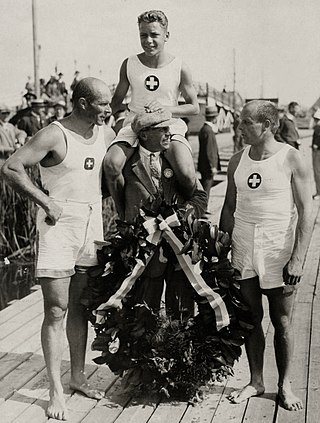
The men's coxed pair event was part of the rowing programme at the 1928 Summer Olympics. It was one of seven rowing events for men and was the fourth appearance of the event. It was held from 3 to 10 August near Sloten, Amsterdam. There were 6 boats from 6 nations, with each nation limited to one boat in the event. The event was won by the Swiss team, the nation's second consecutive victory in the event. Brothers Hans Schöchlin and Karl Schöchlin rowed, with Hans Bourquin the coxswain. Another pair of brothers took silver: France's Armand Marcelle and Édouard Marcelle. The Belgian bronze medal team consisted of Léon Flament, François de Coninck, and Georges Anthony; it was the nation's first medal in the event.
Jacob Jepsen Barsøe is a Danish rower who won a silver medal at the 2016 Summer Olympics and bronze medal at the 2012 Summer Olympics, both in the men's lightweight sculls.

Martino Goretti is an Italian representative lightweight rower, a current (2019) world champion and a dual Olympian. He has represented at senior World Rowing Championships and World Rowing Cups consistently from 2005 to 2019. He is a four time world champion at the senior level who won three titles in Italian lightweight eights from 2005 to 2009 and then in 2019 won the lightweight single scull world title. He had previously won underage world championships as a junior and an U23.
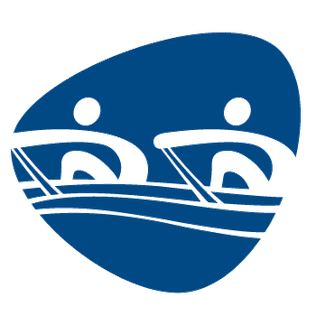
The rowing competitions at the 2016 Summer Olympics in Rio de Janeiro took place from 6 to 13 August 2016 at the Rodrigo de Freitas Lagoon in Lagoa. Fourteen medal events were being contested by 547 athletes, 334 men and 213 women.

The men's coxed four competition at the 1932 Summer Olympics in Los Angeles took place at the Long Beach Marine Stadium. It was held from 10 to 13 August. There were 7 boats from 7 nations, with each nation limited to a single boat in the event. The event was won by Germany, the nation's first victory in the event since 1912 and third overall. Defending champions Italy came within 0.2 seconds of repeating, with Germany passing them at the very end of the final. Poland won its second consecutive bronze medal.
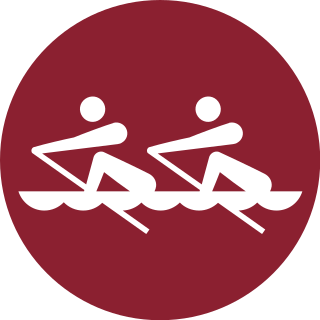
The rowing competitions at the 2020 Summer Olympics in Tokyo took place between 23 and 30 July 2021 at the Sea Forest Waterway in Tokyo Bay. Fourteen medal events were contested by 526 athletes.

The Russian Federation competed at the 2016 Summer Olympics in Rio de Janeiro, Brazil, from 5 to 21 August 2016. This was Russia's sixth consecutive appearance at the Summer Olympics as an independent nation. The nation finished fourth in the medal standings, with 19 gold and 56 total medals, ensuring that Soviet and Russian athletes had never placed below fourth since they started participating in 1952.
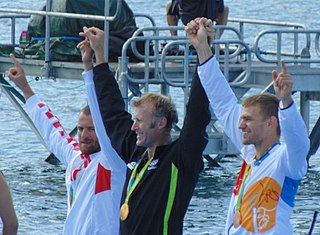
The men's single sculls competition at the 2016 Summer Olympics in Rio de Janeiro was held from 6 to 13 August at the Lagoon Rodrigo de Freitas. There were 32 competitors from 32 nations. The event was won by Mahé Drysdale of New Zealand, the sixth man to successfully defend an Olympic title in the event. He won an exceptionally close final against Damir Martin of Croatia. Martin's silver was Croatia's first medal in the event. Bronze went to Ondřej Synek of the Czech Republic. Both Drysdale and Synek earned their third medal in the event; Drysdale had taken bronze in 2008 before winning in 2012 and 2016, while Synek had twice been the runner-up in 2008 and 2012 before this third-place finish.
The men's coxless pair competition at the 2016 Summer Olympics in Rio de Janeiro was held from 6 to 11 August at the Lagoon Rodrigo de Freitas.
The men's coxless four competition at the 2016 Summer Olympics in Rio de Janeiro was held from 8 to 12 August at the Lagoon Rodrigo de Freitas.
The women's lightweight double sculls competition at the 2016 Summer Olympics in Rio de Janeiro was held on 8–12 August at the Lagoon Rodrigo de Freitas.

The Gold Four is the nickname for a Danish men's lightweight coxless four crew who between 1994 and 2016 has won three Olympic gold, one silver and two bronze, and eight gold and three silver medals at the world championships, making them one of the most successful crews in rowing history. There were 17 team members in total. The boat class was disestablished after the 2017 World Rowing Championships to achieve gender equality in rowing, with the Danish team last competing at the 2016 Olympics.

The men's coxed four competition at the 1956 Summer Olympics took place at Lake Wendouree, Ballarat, Australia. It was held from 23 to 27 November and was won by the team from Italy. There were 10 boats from 10 nations, with each nation limited to a single boat in the event. Italy had previously won this event in 1928, tying Switzerland for second-most wins among nations. Sweden (silver) and Finland (bronze) each won their first medal in the men's coxed four. Switzerland had its three-Games silver-medal streak broken, without a Swiss crew competing.
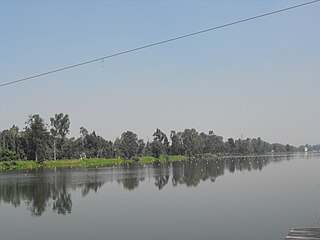
The men's coxed four competition at the 1968 Summer Olympics took place at Virgilio Uribe Rowing and Canoeing Course, Mexico City, Mexico. It was held from 13 to 19 October and was unexpectedly won by the team from New Zealand, which secured the country its first Olympic rowing gold medal. Thirteen teams from 13 nations attended the competition. East Germany earned its first medal in its debut in the event, taking silver. Switzerland took bronze, its first medal in the men's coxed four since 1952.

The men's coxed four (M4+) competition at the 1976 Summer Olympics took place at the rowing basin on Notre Dame Island in Montreal, Quebec, Canada. It was held from 18 to 25 July and was won by the team from Soviet Union. There were 14 boats from 14 nations, with each nation limited to a single boat in the event. The victory was the Soviet Union's first medal in the men's coxed four. East Germany took its third consecutive silver medal, with entirely different crews each time. The defending champion West Germany received bronze this time. Hans-Johann Färber, the only rower from the 1972 gold medal team to return, became the fifth man to earn multiple medals in the event.

The team of the Olympic Federation of Ireland, which competed at the 2020 Summer Olympics in Tokyo, represented athletes from both the Republic of Ireland and those from Northern Ireland who choose it instead of the Great Britain and Northern Ireland team. Originally scheduled to take place from 24 July to 9 August 2020, the Games were postponed to 23 July to 8 August 2021, due to the COVID-19 pandemic. It was the team's twenty-second appearance at the Summer Olympics, having attended every edition since 1924 except the 1936 Summer Olympics in Germany.













